- Home
- Angela Huth
Monday Lunch in Fairyland and Other Stories Page 5
Monday Lunch in Fairyland and Other Stories Read online
Page 5
He drank only a cup of black coffee for breakfast, and left for the office feeling icy cold, flesh taut against his bones. He crossed the road and stopped to look back at the leaf-green façade of their house – a small, narrow house in a quiet street behind Notting Hill Gate. They had found it soon after they married. In summer, Laura filled its window boxes with pansies and geraniums; now, they were planted with small evergreens bright with orange berries. It was a nice, conventional house, with a welcoming look about its windows. One of them, the kitchen, was lighted. Philip could see Laura moving about, a grey silhouette, gathering up the breakfast things. He wondered how long it would be before the telephone rang and she and Crispin arranged today’s meeting. As he wondered Laura bounced towards the telephone on the dresser. Philip saw her nod. He saw her smile. He felt his breath come very fast – for a moment he opened his mouth and gasped the air, letting out a small moan – then struggled for control. Laura put down the telephone and left the room. A light went on upstairs, in the bedroom. As Philip’s eyes travelled towards it he noticed a web of cracks over the green paintwork of the façade. The paintwork is cracking, he thought to himself: it’s time we had it done. I must tell Laura to organise repainting. He turned away, began to walk towards the underground. How strange, he thought, that green paint should last so little time. Must be pollution. Pollution destroys everything.
When he rang Laura from the office at five she answered the telephone. Relief confused him. He could think of nothing to say.
‘It was just – I noticed cracks all over the front of the house this morning. The paint. It’s worn so badly. We must get it done. Could you ring the builders before –’
‘Cracks? What are you talking about?’
‘Cracks, darling. All over the front of the house. Honestly.’
‘But there isn’t a crack to be seen.’
Philip could sense her puzzlement.
‘Well, never mind. Maybe, in the fog – I must have imagined it.’
‘You must have.’
‘Be back in an hour.’
So today she and Crispin must have done it at lunchtime. Crispin must have had to get an early train back to Oxford. The weekend. Of course, the weekend. How would they communicate between tonight and Monday? Philip decided to make sure he would answer every telephone call. He could not bring himself to ask questions, but if he caught her out she would have to explain.
And there was nothing else for it. He would catch her out. Exhausted by the thought, he set off for home.
Philip unlocked the front door very quietly, a sense of horror at his own action. He could hear Laura talking on the telephone in the kitchen. Unusually low voice. A laugh. Noiselessly, Philip pulled the door shut behind him, crept a few paces further into the hall. Then he stood, quite rigid, and listened.
‘That’s funny,’ he heard her say. ‘That’s terribly funny. I want to hear more when I see you.’ Oh, they had their jokes, she and Crispin. Riotous jokes he knew nothing about, killingly funny jokes to make them squirm and giggle between kisses.
‘So you’ll be here tomorrow, then,’ she was saying, ‘about three. We might see if there’s something good on locally.’
Tomorrow? Michael, her younger brother, was coming to visit them tomorrow. A great heat exploded in Philip’s head. He swung round, opened the front door, banged it shut, pulled off his coat, ran up the stairs as the telephone clicked. Laura must not see him in this state.
He shut himself in the bathroom. Its familiar pinkness was unstable, as if he had cocooned himself in a shaking blancmange. Breathe deeply, Philip, he said to himself, leaning against the basin, and take a look at yourself.
He saw in the pink glass mirror the face of a man who had been spying on his wife: a man haunted by suspicion, convinced by instinct Wild hair, huge eyes, fear.
‘You’re loathsome, you’re despicable,’ he said. ‘How far will you go?’
Later, some measure of equilibrium restored, he poured himself an extra large gin and tonic and paced the small sitting-room. Laura sat in one corner of the sofa doing her tapestry, half-smiling, innocent as usual.
‘You’re restless,’ she said.
‘I am, rather.’
‘Anything the matter?’
‘No. Not sleeping very well, I suppose.’
Sated by her own life, Laura had no notion how troubled were his nights. He had often thought of waking her, asking her for the truth which would put an end to his own suffering.
‘Come to think of it, you seem to be rather thin.’ Laura’s eyes travelled all over him. ‘Perhaps you’re getting something.’
‘Perhaps.’ Philip sat down at last, crossed his legs, spun one ankle. ‘I often wonder,’ he said, ‘how you fill your days. Sometimes at the office, you know, I try to image what you’re doing, and I’ve really no idea.’
Laura glanced at him. Quickly smiled.
‘I think I’d better keep you in the dark. If I told you the truth you’d not only be bored, you’d be ashamed of me for not thinking up better ways to pass the hours. But I’ve decided quite seriously that after Christmas I’ll get a job – in fact I’ve more or less found one. That art gallery in Notting Hill Gate – you know – they apparently want someone half-time. That would suit me very well. Be a good idea, don’t you think?’
‘I should think it would.’ Philip plucked at his Hong Kong trousers. Of course a part-time job would suit her well. Regular hours would mean terrible complications, maybe even the necessity of deceit. Oh Laura! So quiet, so tranquil, in the lamplight, how is it that you love someone else, that you count the hours till you see him, that you let him into the most private parts of you. . .?
‘Oh, Laura!’ he cried out loud.
‘Philip!’ She ran to him, put a cool hand on his forehead. ‘What is it? You’re looking most . . . peculiar.’
‘Don’t touch me, please.’ He removed her hand.
‘What is it?’
‘Leave me. I’m all right. I just . . . I’ll ring Dr Bruce in the morning. Get some tranquillisers.’ He rose and went to the tray of drinks. ‘Worry about all this . . . redundancy. It’s affecting us all.’
‘Of course.’ Laura’s face expressed perfect concern. ‘But you don’t normally let office worries get on top of you like this. Perhaps you need a break. Perhaps after Christmas we should go away for a week.’
‘Perhaps. But you wouldn’t want to go away for a week, would you?’
‘Of course I would!’ Her indignation was genuine enough. ‘What do you mean?’
‘All right, then. I’ll get tickets for one of those cheap tours to Venice.’ You lying little hypocrite, I’ll take you at your word.
‘What a lovely idea!’ What’s more, you bloody little actress, not for one moment will I let you out of my sight – no chance of your slipping off to the Poste Restante. . .
Philip half filled his glass with gin.
As far as he could tell Laura and Crispin had no form of communication over the weekend, but the private canker within Philip spread. Tranquillisers did nothing to abate the torment of his suspicions. He could neither eat nor sleep. And yet, some basic habit of maintaining appearances kept him going, while within him a devil voice lashed constant abuse at Laura. Outwardly he was friendly, gentle: they continued to lead their quiet lives with little reference to Philip’s disintegrating appearance. He could sense Laura’s concern but, knowing he abhorred fuss, she refrained from questioning him, merely said all would be well in January.
Two weeks went by. During this time Philip rang Laura every day at five, and she was never at home. On his return each evening she flourished her cold shining cheeks, the sparkle in her eyes betraying her rewarding afternoon. Still Philip endured her condition in silence, though some evenings the physical pain in his chest was so bad he would shut himself in his study for half an hour, and bend double in the armchair to alleviate the ache.
Then, one morning after a particularly bad night, he came down early to
make Laura breakfast. Having inwardly riled against her most of the night, he thought this was the least he could do for her, to make private amends. On his way to the kitchen he picked up the post from the mat, shuffled through the letters.
There was one with an Oxford postmark. Stiff white envelope, intelligent writing in black ink. Philip stared at it till the words blurred before his eyes, and a vile sweat pricked over his back.
He made two cups of coffee and took them upstairs on a tray with the letters. Laura was waking, stretching, smiling, pleased at the treat of breakfast in bed. For the first time for many mornings a pallid sun slanted into the room, cheering the timid blues of curtains and walls. Philip, conscious that the sweat that now covered his body smelt strongly, sat on the edge of the bed and watched his wife closely.
She was very clever. When it came to opening the thick white envelope she made no comment, simply slit it with a knife. She pulled out a white card, read it quickly, and passed it to Philip.
‘Crispin and Moira want us to go to some lunch party on Sunday.’ Voice quite level.
Philip held the card between finger and thumb as if it were edged with blades. This, of course, was all part of a well-constructed plan. Crispin and Laura apparently saw no treachery in organising social meetings as well as clandestine ones.
‘Don’t let’s go to that,’ he said.
‘Why ever not? It should be rather fun.’
‘Well, I’m not going. I don’t like Moira and I like Crispin even less. Pretentious man, to say the least. And most of all I don’t like donnish Oxford parties.’
‘Oh, Philip.’ Laura’s mouth, rather thin, was not made for pouting. It curved downwards. ‘That’s silly of you. You can’t generalise like that. You can’t simply say you don’t like all Oxford parties. Moira’s and Crispin’s might be quite different.’
Philip stood up.
‘It might, but I’m not going. You can do what you like.’ His dressing gown fell apart. Glancing down, he saw the gleam of sweat on his stomach, realised the ridiculous sight he must be to Laura. She smiled up at him.
‘No need to sound so fierce. I don’t really mind –’
‘And don’t lie to me, Laura!’ The roar of Philip’s voice shook the room. ‘Go to the party without me if you want to – I don’t care a damn how many parties you go to, but don’t lie to me!’ The sudden fear and miscomprehension in her eyes goaded him. ‘Go on, go! D’you hear me? All the way to Oxford for another little lesson in Chekhov. God Almighty!’ He flung off his dressing gown: the sour smell of his own sweat almost stifled him. He ran one hand down his stomach, wet flesh upon wet flesh: with the other he pulled back the bedclothes, watched the lilac slip of Laura’s body cower into itself like a night flower at dawn. She screamed.
Philip was upon her. He was aware, from the way she turned her head from his mouth, that his breath was evil, and that his jowl scratched her cheeks, inflaming them with ugly red. He was aware of tin tacks in his flesh, of the dryness of Laura, of terrible moaning noises from them both.
When it was over he left her exposed and crying on the bed. He dressed quickly and went from the house without saying goodbye.
In Holland Park the sun was gentle among bare trees. Philip sat on a bench, head in hands. I am ill, he thought. I have a virus that turns reason to unreason, makes me savage my wife, abuse her, suspect her. Dear God, he thought, I am a man debased by a feeling I should be able to overcome. I understand it to be irrational. Understanding that, perhaps it will go from me. He looked slowly about as if searching the air for a cure. The bare branches were cruel against his eyes, flaws in the winter sky. His whole body ached with the kind of pain caused by flesh that is too thin to protect raw bone from the elements. He stood. He began to walk back down the path, heavily as a man breast-high in water who pushes against a strong current.
At the office, dully, no greeting to his secretary, he shut the door. Telephoned Laura.
‘I’m sorry.’
‘Oh . . . that’s all right.’ Pause. ‘I mean, it’s the first real row we’ve ever had, isn’t it? It had to happen some time. Though I’m not sure what it was all about.’
‘Nor am I.’
‘Are you all right?’
‘Yes.’
‘Well . . . thank you for ringing.’
‘And thank you for being so . . . I don’t know what came over me.’
‘No need to go on.’
Philip called for black coffee and a glass of brandy. The relief of his wife’s forgiveness gave him strength to start the fight. He would rid himself of the disease through an act of supreme will. He was, after all, a strong man. First thing to do was to resist ringing Laura at five. He achieved this. But when, on reaching home, he kissed her cold bright happy cheek, the physical pain restruck with a force that overwhelmed all his good intentions. He realised, as he lay awake that night, mind seething with vile possibilities, that it was going to be a long battle.
A week later, swallowing tranquillisers with his coffee in the office – they merely misted the superficial pain, did nothing to banish the fundamental ache and racing mind – he decided to tell Laura what had happened. This would mean risking possible disaster. There was also a small chance it might save and cure. A chance worth taking. Tonight. The positive decision fanned a small flame of strength. Philip picked up a long report, began to read. The uneasy looks of his colleagues, of late, had not gone unobserved; their concern for him was plain. He would now concentrate on putting their minds at rest. Then his private telephone rang. Laura.
‘Sorry to bother you – but do you think you could possibly take the afternoon off?’ She sounded breathless, excited.
‘Well, yes, I dare say. But why?’
‘It’s quite important.’
‘What is it?’
‘I don’t want to tell you now. Just come home in time for lunch. Please.’
‘All right. How very mysterious.’ He tried to sound light hearted.
He put the report back in a drawer knowing that further work that morning would be impossible, and decided to walk home. It would take an hour and so exhaust him, in his weakened state, that, by the time she broke the bad news, he would have achieved a protective sense of stupor. He strolled along the City pavements, St James’s Park, Hyde Park, afraid. When finally he reached the front door he felt faint and dizzy, as he had felt on occasions in church as a child.
For the first time Laura did not try to conceal her anxiety. He looked dreadful, she said, and insisted he should see the doctor again tomorrow. Philip, with little energy left to argue, let the warmth of the house seep into his cold flesh. Gratefully he drank a glass of red wine and managed to eat half a plate of soup.
‘Now,’ said Laura, ‘I’d like you to come with me in the car.’ She was authoritative, bossy, pretty. The warmth of her reached through Philip’s fatigue. In the car, he wanted to touch her. But he remained quietly with hands in his lap, asking no questions. He assumed they were going to some mysterious rendezvous to meet Crispin and decide upon their future.
Laura drove to Queensway and parked in front of the skating rink.
‘Here,’ she said. ‘We’re here.’ She paid their entrance money – Philip’s reactions were too slow to reach for his wallet – and led the way downstairs. There was a heavy chill about the place that made Philip visibly shudder. It vaguely occurred to him that this was a strange place to meet with an Oxford don: too cold. Perhaps they would sit in the cafeteria behind the glass screen. It would be warmer there, round a small Formica table with a cup of tea.
‘You wait here,’ Laura was saying. ‘I’ll be back.’
Philip sat on a chair behind the barrier at the edge of the rink, no longer much in possession of his senses. Before him several dozen skaters, mostly women and children, skittered about the ice. A few of them were fast and competent, masters of their movements, spinning and zooming in tight-lipped silence, the keen wind of their own speed their only awareness. Others clutched, squ
eaked, fell, and rose again without the benefits of grace or balance. Nightmare people. None of them was Crispin.
A gong boomed. Philip jerked, afraid: felt a skein of sweat over his back. Clutching at his neck with a cold hand, he looked about for Laura. Where was she? And what was he doing here?
The skaters crowded to the exits in the barriers. Only the good ones remained on the ice. Music, suddenly: an organ blurred by bad acoustics playing a tune from a fifties musical. The skaters, in pairs now, began to dance.
Not far from Philip a familiar girl stepped on to the ice. Laura, it was. She wore a short pleated skirt, red tights and new-looking boots. She waved at him, smiled. Behind her came a thin figure all in black, except for a small badge on his breast. He had the impassive look of a skating instructor, his sharp face frozen into inanimation that comes from years of skimming over blank ice. He put an arm round Laura’s waist.
The music changed to a slow waltz. Laura and her partner moved, cautiously. They were straight-backed, fluid. Gradually, they gathered speed, dipped and swerved in unison. They reached a corner: turning backwards, Laura quavered a little. The androgynous black arm tightened round her waist, supportive. Laura’s face was pinched with concentration. She did not look towards Philip.
Philip’s eyes never left the scarlet and black pair. They blurred and fuzzed, became dots, then fur, then for a moment hardened into sharp focus. All the while, beneath his raw skin, he felt the blood seep from his veins, taking with it the old pain in his breast-bone, and leaving an overwhelming feebleness. He lifted one arm on to the edge of the barrier, lowered his head on to the coldness of his sleeve. Beneath his feet the black rubber flooring, holed like crochet, gleamed with the water of melted ice. The dreadful organ thumped out a Beatles tune. Philip put his free hand to his face to prod the numbness. He felt a hot mess of tears on his cheek.

 Sun Child
Sun Child South of the Lights
South of the Lights Virginia Fly is Drowning
Virginia Fly is Drowning Of Love and Slaughter
Of Love and Slaughter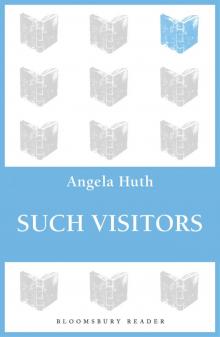 Such Visitors
Such Visitors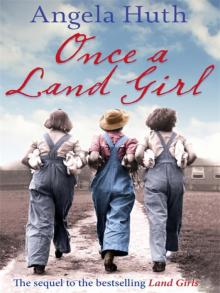 Once a Land Girl
Once a Land Girl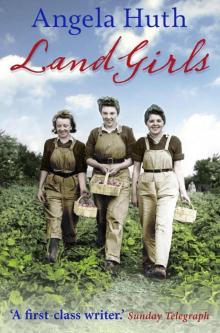 Land Girls
Land Girls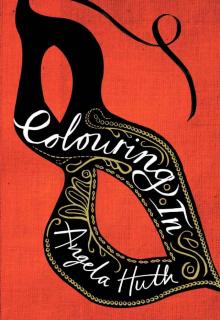 Colouring In
Colouring In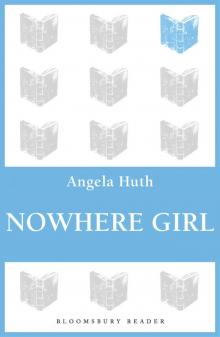 Nowhere Girl
Nowhere Girl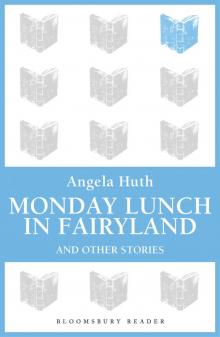 Monday Lunch in Fairyland and Other Stories
Monday Lunch in Fairyland and Other Stories Another Kind of Cinderella and Other Stories
Another Kind of Cinderella and Other Stories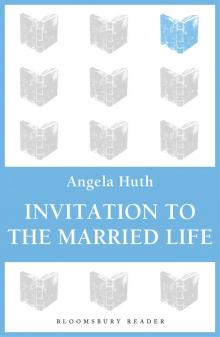 Invitation to the Married Life
Invitation to the Married Life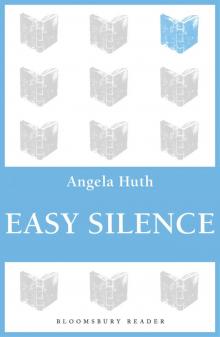 Easy Silence
Easy Silence